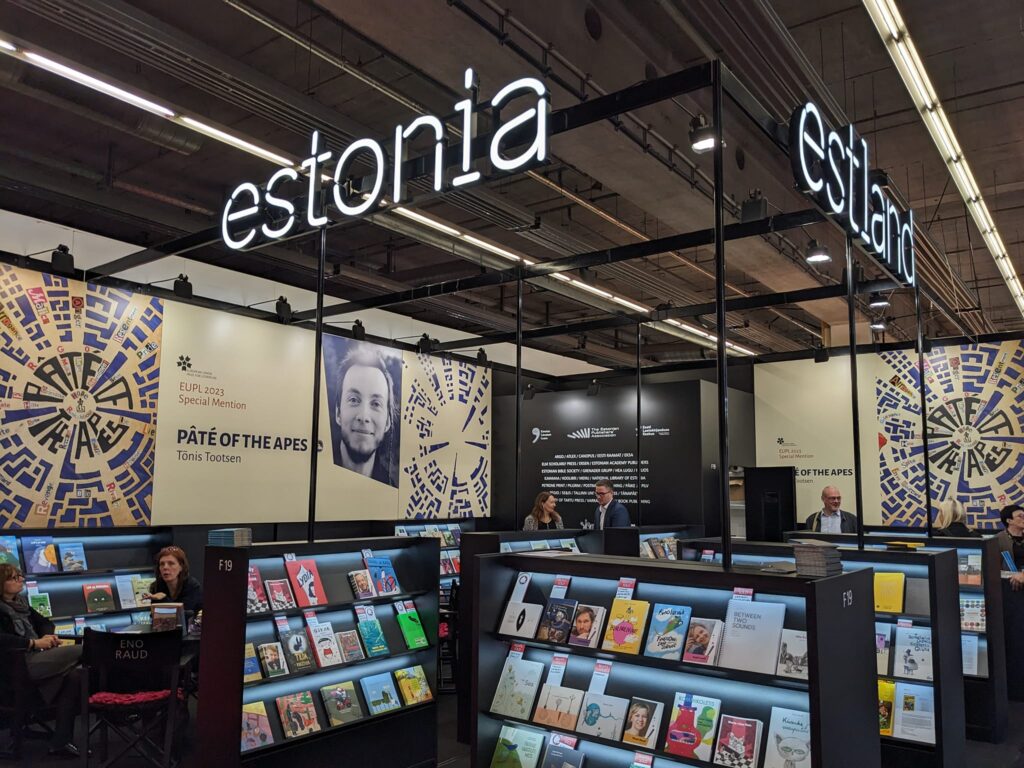Interview with Julie Belgrado, Director at European and International Booksellers Federation (EIBF)

(C) EU
This interview is facilitated by EUPL and funded by the European Union.
- Please explain what the European and International Booksellers Federation is about? Also, please explain the “and beyond” that is in the introduction on the EIBF website.
EIBF represents national booksellers’ associations in the European Union and at an international level. Through its member associations, EIBF speaks on behalf of more than 25.000 individual booksellers of all kinds, including independent bookshops, chains, family businesses. EIBF membership covers a wide geographic area from the Faroe Island to Latvia, and from Germany to New Zealand. Our members are the national booksellers trade associations mentioned in the sentence above. Examples of members include: The Booksellers Association of the UK and Ireland, Börsenverein in Germany, Swedish Booksellers Association,
Ceylon Importers and Exporters Booksellers Association – Full list: https://europeanbooksellers.eu/booksellers-associations
- What are the services that EIBF offers?
We represent our members and their interests on a global platform, before the European institutions and other international organisations. Our mission is to further the interests of the bookselling industry, by ensuring that the voices of booksellers are heard in every relevant debate.
We do this by meeting with decision makers from European and international institutions, explaining the specificities of the bookselling industry at different stages.
Additionally, we strengthen the link between booksellers’ associations worldwide, to enable knowledge exchange, innovation and growth, especially through our RISE Bookselling programme. The links are strengthened by initiatives such as organising a conference for members in Frankfurt (https://europeanbooksellers.eu/press/eibf-75th-frankfurt-book-fair), 4 international calls/year where members can informally exchange about the situation in their respective countries (https://europeanbooksellers.eu/press/eibf-international-call-highlights-challenges-and-initiatives-global-bookselling), etc.
- Does it explore strategic partnerships with countries outside the EU?
Yes. EIBF is a membership-based organisation, open to booksellers’ associations and independent booksellers from all over the world. Our non-EU members include: Norway, German-speaking Switzerland, the UK, Canada, USA, Australia, New Zealand and more recently Sri Lanka. We also have booksellers from the Faroe Island, Guatemala and Kyrgyzstan who are members of our association on an individual basis. Part of our team also visited the Guadalajara International Book Fair for the first time in order to develop further our relationships with Latin American Booksellers.
4. What are the major trends in European bookselling? Are these different from the rest of the world?
This question is way too broad to answer without a specific angle. I recommend you go through our Global Bookselling Report to decide which aspects you’d like to have in your article: https://europeanbooksellers.eu/press/eibf-launches-2022-report-on-global-book-markets
- Fascinatingly, during the covid pandemic, there was a massive boost to book sales. Post-pandemic, what is your view on the co-existence of strategies for retail stores in the physical and digital world? What should be the focus? Can they be separated or must they align or be in a symbiotic relationship with each other? What is your opinion?
Today’s bookselling business can no longer be summed up as a solely off-line activity. The COVID-19 pandemic heralded an immense interest in shopping online with local businesses, including independent bookshops. To stay up to date and cater for their customers’ constantly changing needs, modern bookselling has had to become a hybrid profession: booksellers now need to have one eye on the physical, brick-and-mortar shop, and the other on the digital shop window.
This new aspect of the trade inevitably brings new challenges – e.g., the need for technical skills and legal expertise on how to conduct e-commerce – which are not always solved intuitively. Lots of small independent bookshops needed help to take the plunge into the online – help which was in many cases provided by their trade association or other bookseller collectives in the shape of a common e-commerce platform. The creation of these platforms has shown that what may seem impossible when on one’s own, is perfectly feasible together.
There is a continued interest in shopping online with independent bookshops, even after the end of the COVID-19 pandemic. This shows that e-commerce is not only for those large market players and big tech companies anymore: there is a specific place and role to play for independent, local bookshops
- Do the existing fixed book rates in some European countries such as France and Germany result in interesting bookselling scenarios for EIBF?
I don’t understand the question. EIBF is a trade organisation that represents the interests of all its members. Some of our members operate in a fixed book price market and some don’t. Our work is to help and support them, as well as provide them with advice when necessary. Fix/free book price are a national policy matter.
- How did you get into bookselling?
I hold a degree in European journalism and a master in media and business. My first internship after graduating was with the Federation of European Publishers (FEP), the other organisations implementing the European Union Prize for Literature. After 5 months with them, I started a second internship with the European and International Booksellers Federation (EIBF), and then was hired there as a full-time employee to oversee the European Affairs and Communications. I took over as Director in April 2019, when the former Director left the organisation. Both times – when I was first hired as a full-time employee and when I took over as a Director – the EIBF board required that I spent some time working in a bookshop, in order to have first-hand experience on the ground. I fully agreed with their request. As I represent the interests of booksellers on a daily basis, it was important to me to fully comprehend what booksellers’ reality is like. So, all in all, things just naturally came one after the other and, since I’ve always been an avid reader and a bookshop lover, I never cease to be amazed by booksellers’ resilience and creativity, which are what make my daily work so enjoyable.
8. Does an author see a boost in their sales in Europe after winning the EUPL prize?
Answering that question would require to look at sales data for the specific book of a specific author in a given country, which we don’t have and is not the objective of our Prize. The aim of the Prize is to promote the circulation of literature within Europe and encourage greater interest in non-national literary works through translation. Does an author see a boost in their book translation after winning the EUPL Prize? Yes, definitely! You just need to take a look at the different authors’ profiles on the EUPL website where we list their respective translation deals.
9. Has the EUPL Consortium been able to analyse the direct and indirect impacts of winning the EUPL Prize?
Please note that EUPL is organised by a Consortium that comprises two different organisations: the Federation of European Publishers (FEP) and the European and International Booksellers Federation (EIBF). We are therefore not the only ones in charge of doing the analysis/assessment work.
All in all, direct and indirect impacts are difficult to quantify, since we cover 41 countries, over a cycle of three years, since 2009. That represents more than 150 authors and a huge amount of information to keep track of. However, there are some qualitative trends that we have been able to identify over the years. As mentioned in my answer to the previous question, a direct impact of winning the EUPL is the increased number of translations for a given book. One of our authors with the highest record is North Macedonian author Goce Smilevski whose book Sigmund Freud’s Sister was translated into more than 25 different languages.
It has also become clear over time that smaller countries and/or countries that do not have a plethora of literary Prizes do see a great added-value in the EUPL, especially in its potential to convey national literature across borders. EUPL 2023 special mention for Estonia, Tõnis Tootsen, was featured quite prominently on the Estonian stand at this year’s Frankfurt Book Fair for instance (see below).
Among the indirect impacts we’ve noticed and that authors themselves have mentioned, are the opportunities to expand one’s own network; be it by connecting with other authors or other professionals from the book sector. Through EUPL, winners and nominated authors get the chance to take part in book fairs, festivals and other type of events. Those events are the opportunity for them to meet with fellow EUPL authors from the same or previous editions, as well as to exchange with publishers or translators.

10. What are the promotional strategies (offline and online) that the EUPL Consortium employs for the EUPL Prize winners?
Please note that EUPL is organised by a Consortium that comprises two different organisations: the Federation of European Publishers (FEP) and the European and International Booksellers Federation (EIBF). We are therefore not the only ones in charge of the promotional strategy.
Offline (in person events): Each author nominated for a given EUPL edition, benefits in that same year of a bookshop event, organised in their home country by the EUPL consortium. The idea being to spotlight their book, their Prize nomination and give them the opportunity to exchange with their readers at home. We also have long-lasting partnerships with the main book fairs in Europe, including the Frankfurt Book Fair, where we organise events to promote EUPL authors.
Offline/Online (the anthology): Every year, we produce an anthology that compiles 5-page excerpts of all the nominated books of that year. Each excerpt is available is original language and in English translation. All anthologies can be found here. They are downloadable in E-Pub format and accessible E-pub format since the 2018 anthology. Paper copies of the anthology are distributed at the bookshop events and at most major book fairs, especially at the right agents’ centre, in order to spark interest for translation.
Online (EUPL social media channels, website and newsletter): EUPL is present on Facebook, Twitter and Instagram. These channels are dedicated to sharing news about the Prize itself, but also the latest news of our authors past and present, including new books, new translations, other Prizes they won, etc. The aim is to keep promoting them, even years after they were nominated for the Prize and to give them more visibility through our channels. The same goes for our newsletter that features information about the current edition, as well as news about authors who were nominated in previous years. As for our website, it spotlights the latest news about the Prize, including the events we organise and where EUPL authors are present. Additionally, each EUPL author benefits from a profile page on our website that introduces their winning book, translation deals for that book, and a short biography.
Online (partnership): In the same way that we are answering this interview, we also work in partnership with different journalists, bloggers, reviewers, etc. to promote the Prize at local, national, European and international level. For three years now we’ve had a partnership with Trafika Europe Radio, an online radio that puts the spotlight on European authors and recorded podcasts with our authors. We’ve also been working for the same amount of time with French blogger and literary reviewed Tara Lennart from Bookalicious who’s showcasing the Prize and our authors towards a French-speaking audience.
Disclaimer: This paper was written under the European Union Policy & Outreach Partnerships Initiative with the view to promote European Union Prize for Literature awardees. The publication was funded by the European Union. Its contents are the sole responsibility of the authors and do not necessarily reflect the views of the European Union.

No Comments